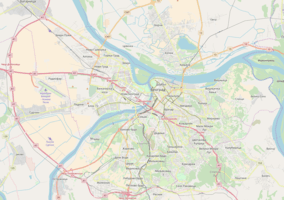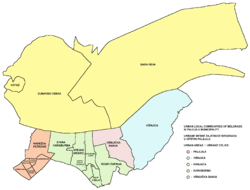Hadžipopovac
| Hadžipopovac Хаџипоповац | |
|---|---|
| Urban neighbourhood | |
 Hadžipopovac Location within Belgrade | |
| Coordinates: 44°48′37″N 20°29′58″E / 44.81028°N 20.49944°ECoordinates: 44°48′37″N 20°29′58″E / 44.81028°N 20.49944°E | |
| Country |
|
| Region | Belgrade |
| Municipality | Palilula |
| Time zone | UTC+1 (CET) |
| • Summer (DST) | UTC+2 (CEST) |
| Area code | +381(0)11 |
| Car plates | BG |
Hadžipopovac (Serbian: Хаџипоповац) is an urban neighborhood of Belgrade, the capital of Serbia. It is located in Belgrade's municipality of Palilula.
Name
The neighborhood was named after the land owned by the old Belgrade family of Hadži-Popović in the area.[1]
Location
| Hadžipopovac | ||
|---|---|---|
| Year | Pop. | ±% |
| 1981 | 5,030 | — |
| 1991 | 4,378 | −13.0% |
| 2002 | 6,219 | +42.1% |
| 2011 | 3,863 | −37.9% |
| Source: [2][3][4][5] | ||

Hadžipopovac is located in the central part of urban section of the municipality. It borders the neighborhood of Paliula to the south, municipality of Zvezdara (neighborhood Slavujev Venac) and Novo Groblje cemetery to the east, neighborhood of Bogoslovija to the north and the neighborhood and municipality of Stari Grad to the west. Hadžipopovac is bordered by the streets of Ruzveltova, Cvijićeva, Zdravka Čelara, Čarlija Čaplina. Hadžipopovac has one elementary school , "Oslobodioci Beograda". A lot of neighborhood children also go to elementary school "Vuk Karadžić" which is on a border of Hadžipopovac and Stari Grad. There is a lot of cafes, bars and taverns in Hadžipopovac. Old and famous tavern in this neighbourhood is "Kosmaj".
After World War II it was the eastern border of the city, today it is kilometers away from the eastern border of Belgrade.
The local community of Hadžipopovac had a population of 3,863 in 2011. Administrative name of the local community until the 2000s was "Oslobodioci Beograda".
At the corner of the Cvijićeva and Ljube Didića streets, there is a "Park Jovan Cvijić", which is the smallest official park in Belgrade. It developed in the 1960s, when the surrounding residential complex was also built. It covers an area of 1,420 m2 (15,300 sq ft).[6]
Profesorska Kolonija
| Profesorska Kolonija | ||
|---|---|---|
| Year | Pop. | ±% |
| 1981 | 3,792 | — |
| 1991 | 3,636 | −4.1% |
| 2002 | 3,306 | −9.1% |
| 2011 | 2,634 | −20.3% |
Roughly, eastern section of Hadžipopovac borders with the neighborhood of Profesorska Kolonija (Serbian: Професорска колонија). It has newer buildings than the rest of Hadžipopovac which is a cause for the popular quarrels between those who consider them inhabitants of Hadžipopovac and those from Profesorska Kolonija. Name of the neighborhood is Serbian for "Professor's colony".
The neighborhood developed during the Interbellum. It was mostly inhabited by the families of the Belgrade University professors and of members of the Serbian Royal Academy, hence the name.[7]
Profesorska Kolonija is administratively organized as the local community of "Jovan Cvijić" which had a population of 2,634 in 2011.
House of Milutin Milanković, at 9 Ljubomira Stojanovića street, where the scientist Milutin Milanković lived, is located in the neighborhood. Milanković himself projected the house which was later declared a cultural monument.[8]
References
- ↑ Nenad Novak Stefanović (13 April 2018). "Zlatna cigla u zidu" [Golden brick in the wall]. Politika-Moja kuća (in Serbian). p. 01.
- ↑ Osnovni skupovi stanovništva u zemlji – SFRJ, SR i SAP, opštine i mesne zajednice 31.03.1981, tabela 191. Savezni zavod za statistiku (txt file). 1983.
- ↑ Stanovništvo prema migracionim obeležjima – SFRJ, SR i SAP, opštine i mesne zajednice 31.03.1991, tabela 018. Savezni zavod za statistiku (txt file). 1983.
- ↑ Popis stanovništva po mesnim zajednicama, Saopštenje 40/2002, page 4. Zavod za informatiku i statistiku grada Beograda. 26 July 2002.
- ↑ Stanovništvo po opštinama i mesnim zajednicama, Popis 2011. Grad Beograd – Sektor statistike (xls file). 23 April 2015.
- ↑ Branka Vasiljević (23 June 2013), "Prestonički parkovi - mladići od šezdeset leta", Politika (in Serbian)
- ↑ Dr. Aleksandar Nedok (6 February 2018). "Profesorska kolonija bez zdravstvene stanice" [Profesorska Kolonija without a healthcare center]. Politika (in Serbian).
- ↑ Daliborka Mučibabić (21 April 2013), "Prestonica bogatija za šest spomenika culture", Politika (in Serbian)